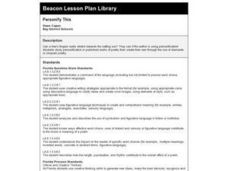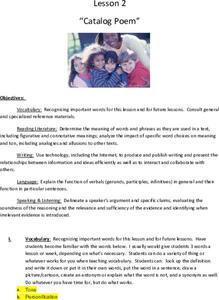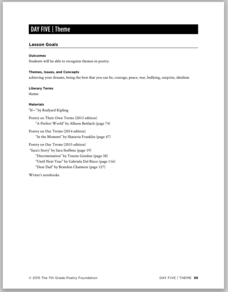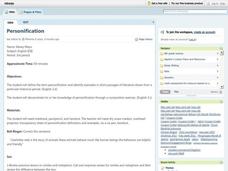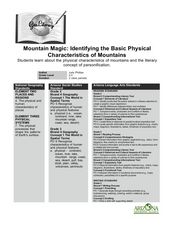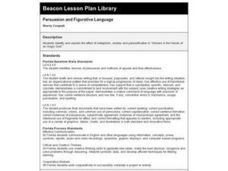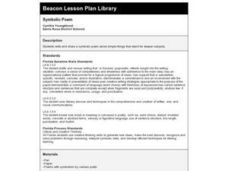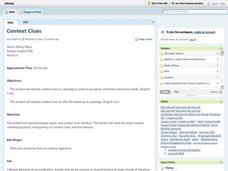Academy of American Poets
Teaching the Vietnam War with Poetry and Archives
The language of and the perspective of photographs, poems, and official reports differ. After a close reading of two photographs, two poems, and a military report about the Vietnam War, individuals adopt someone's voice or something from...
Curated OER
Personification
Second graders recognize personification in texts. In this personification lesson plan, 2nd graders discuss figurative language and how characters can be given human-like qualities. Students read a story and write down examples they...
Curated OER
Rudyard Kipling's "Rikki-Tikki-Tavi": Mixing Fact and Fiction
"Rikki-Tikki-Tavi," from The Jungle Book, offers young readers a chance to examine how Rudyard Kipling uses setting and personification to bring to life the brave mongoose who battles cobras to protect his family. Class members explore...
Curated OER
Rudyard Kipling's Rikki-Tikki-Tavi: Mixing Words and Pictures
Create meaningful illustrations to accompany stories in a web-based art and literacy lesson plan focused on "Rikki-Tikki-Tavi" by Rudyard Kipling. The class takes a virtual art safari with the Museum of Modern Art and then discusses how...
Curated OER
Reading Lesson Plan
Tenth graders read the poem "Still I Rise" and discuss the different ways it can be told and read and brought to life. In this poetry lesson plan, 10th graders read aloud and silently, and compare different works of poetry.
Curated OER
Figurative Language
Students interpret figurative language. In this language lesson, students are read the poem "I Love the Look of Words" by Maya Angelou and are to find examples of hyperbole and personification in the poem. Students then rotate among...
Curated OER
Personify This
Eighth graders study personification in published works of poetry, then create their own through the use of diamante or cinquain poetry. They read and discuss poetry by Shel Silverstein, William Jay Smith, and Elinor Wylie.
Curated OER
Language Arts: Stylistic Devices
Students are able to define given literary terms, such as metaphor, simile, imagery, personification, symbolism, etc. They are able to identify the use of literary elements in a given text. Students are able to interpret weather...
Curated OER
Animal Diaries
Students read Diary of a Worm by Foreen Cronin. In this journal writing instructional activity, students research an animal and write a diary by their animal. Students apply the research they've completed in their writings. Students...
Utah Education Network (UEN)
8th Grade Poetry: Catalog Poem
After conducting a close reading of Billy Collin's poem "Forgetfulness" and responding to questions on a worksheet, young poets craft catalog poems and share their work with a partner. The lesson ends with the partner using the provided...
Utah Education Network (UEN)
7th Grade Poetry: Ode Poem
Walt Whitman's "Captain, My Captain" and Robert Frost's "The Road Not Taken" provide seventh graders with examples of odes. After reading and discussing these and other examples, young poets craft an ode and respond to the ode of a...
Curated OER
Figurative Language
What is figurative language, and why do we use it? Introduce your high schoolers to some examples and discuss the importance of including this element in your writing. After studying a text and searching for examples, writers will...
K20 LEARN
Lord of the Flies Unit, Lesson 1: I'm A Survivor
What three readily available things would you grab in case of an emergency? That's the question that launches a unit study of William Golding's The Lord of the Flies. After sharing their choices, class members read Golding's rationale...
Learning for Justice
Maya Angelou
Maya Angelou's poem, "Still I Rise", offers young scholars an opportunity to consider how poets use literary devices to create powerful messages. After a close reading and discussion of the poem, class members reflect on how they can...
Curated OER
Theme
A study of Rudyard Kipling's poem, "If," launches a lesson about theme. Class members read Kipling's poem and poems by other seventh graders to identify the themes.
Curated OER
Personification
Students engage in a activity about personification. They read passages from Charlotte's Web which are connected to the concept of looking for key words to name the character. Students review the definition of personification, and write...
Curated OER
Figurative Language
Twelfth graders examine personification and alliteration in various reading selections. They read magazine articles, brochures, and advertisements, identify the examples of personification and alliteration, and create a business name...
Curated OER
Identifying Figurative Language
Students explore figurative language. In this Fahrenheit 451 activity, students read the Bradbury novel. As they read, students note the simile, metaphor, and personification examples that they encounter.
Curated OER
Figurative Language Academy Awards
Students examine figurative language in writing. Students demonstrate simile, metaphor, and personification in their own writing.
Curated OER
"Black Boy"
Students read a series of sentences and decide what literary term is being shown. They also discuss a novel about prejudice.
Curated OER
Mountain Magic: Identifying the Basic Physical Characteristics of Mountains
Students read about and identify on maps the physical characteristics of mountains. In this mountains lesson plan, students also write about the characteristics using personification.
Curated OER
Persuasion and Figurative Language
Students study and discuss definitions of metaphor, simile, and personification. In small groups, they read a section of "Sinners in the Hands of an Angry God" and identify those devices. The group presents their examples with the class.
Curated OER
Symbolic Poem
High schoolers read and analyze several highly symbolic poems. They create their own symbolic poem, read it to the class, and discuss whether they can guess any hidden meanings.
Curated OER
Context Clues
Work on context clues with your ninth graders in this lesson, which focuses on identifying and analyzing clues to define unfamiliar words. They identify context clues in a passage to recognize words they haven't seen before, and then...








